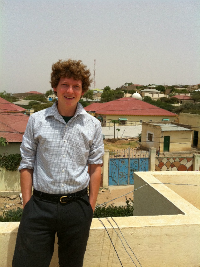A Line Cook in Hargeisa by Sam Chapple-Sokol

My first afternoon after arriving in the capital of the internationally unrecognized country of Somaliland, I called the only +252 number I had: a friend of a Fletcher School aluma who had steered me to this forgotten corner of the world. Rooble Mohamed, a lifelong Somalilander working for Handicap International, greeted me like an old friend and invited me to join him and a couple of compatriots at a new café in town, since Thursdays were the night to go out. (The weekend is Friday. Just Friday.) Sure, why not? Well, the law that prohibited foreigners from being out at night without an armed guard seemed like a legitimate reason to say no, but I thought I should be a little adventurous on my first night there. So, not two hours after arriving in Hargeisa, I was in Rooble’s tinted window sedan, rolling through the city streets blasting Tupac and keeping my head down so the cops wouldn’t see me.
The café was owned by two Somali cousins from the Canadian diaspora who recently returned to start the venture. Suad and Kosar, along with their aunt, opened Daus Internet Café and Pharmacy, because who doesn’t want tea and Tylenol while surfing the ‘net? It is a multi-purpose place—by day, they serve cold drinks and baked goods, offer spotty wifi, and provide a full service pharmacy with a part-time doctor on staff. At night it turns into a dinner spot in the courtyard out back, serving Somali specials as well as dishes that diaspora Somalis—those who have returned from living abroad—long for. As we rolled up to Daus, Rooble told me to try the burger. I came halfway around the world for a burger? When in Rome, I guess.
The front of Daus is nothing impressive—it sits next to a used car and tractor lot, and rogue dogs roam the dusty street. Slipping into the side gate, though, brings you to a world you wouldn’t expect in such a rundown area—fruit trees surround a courtyard open to the stars, and it smells like flowers and French fries. A heavily made-up woman in a hijab and Reeboks greeted us and asked us to sit down. This is Suad. She went to hotel management school in Toronto and studied to be a restaurateur. Instead of starting a Somali restaurant in Toronto, she decided to bring her knowledge home and open a Western-style restaurant in Somaliland. Why not? With such a large diaspora, Hargeisa is a perfect place to serve Western foods. And that’s what is on Daus’ menu: besides classic Somali dishes like b’riis (rice) and basto (pasta), Daus makes lasagna, shepherd’s pie, fajitas, and yes, the best burgers in the Horn of Africa.
The diaspora in Somaliland exists due to an abusive past. Somaliland gained independence from Great Britain in 1960, and five days later, when Italian Somaliland was granted its independence, the two joined to create the union of Somalia. Early hope led to frustration as the new civilian government in Mogadishu became more and more corrupt. In 1969, a military coup led by Siad Barre was met with initial enthusiasm, but as his policies of scientific socialism led to autocratic and increasingly violent rule, the population realized its trouble. Somali society is built on a clan system, and Barre’s Darood clan was longtime enemies with the majority clan of Somaliland, the Isaaq. The clan rivalry soon surfaced, and abuse of the northern population led many Somalilanders to flee abroad. They moved to neighboring countries such as Ethiopia and Djibouti, as well as further afield, to the United Kingdom, Canada, and the United States.(1)
In the early 1980s, the horrors of the Siad Barre regime led a group of diaspora Somalilanders in London to form an organization to fight against the regime and free the north from its grasp. The Somali National Movement, or SNM, launched a guerilla campaign from Ethiopia. Somalia was similarly hosting Ethiopian militants, and in 1988, a joint agreement between Ethiopian president Mengistu Haile Mariam and Siad Barre led to each government ceasing support for the other’s militants and the militants’ subsequent expulsion. Now flushed into open warfare, the SNM forces fought Barre’s troops throughout the north. The Somali government’s greater firepower led to the mass bombardment of Hargeisa, which resulted in tens of thousands of deaths and hundreds of thousands fleeing for other countries. This formed a new wave of diaspora, one that was bred of war.(2)
Many Somalis born in the 1980s grew up in wartime and left with the bombardment, and therefore spent the 1990s and 2000s abroad. While maintaining some Somali customs and culture, they became residents in other countries, integrating as Canadians, as Americans, as Brits. In the mid-to-late 2000s, as Somaliland was able to consolidate peace, many began to return, either just to visit family during summers or to move back permanently. This is what Suad and her cousin did, along with many other young Somalilanders. They have been energetic in establishing businesses: among my friends, one opened a real estate agency, another started publishing tourist guidebooks for visitors to Somaliland, and a third opened both a kindergarten and a wedding hall. Diaspora Somalilanders are also very active in both governmental and non-governmental sectors, with the current president and several ministers, as well as many academics and non-profit leaders, coming from abroad.
It was these Somalilanders that I met at Daus that first night, and on all subsequent visits. Many relied on the café as a connection to their former lives. It was a place set off from the city where people could eat what they used to eat, listen to whatever music they wanted, and do things otherwise not done in public. A group of British Somalis came to Daus every afternoon to chew khat, a narcotic leaf commonly used in the region, and drink sweet tea. Suad and other women would smoke hookah at the café, which is normally taboo for women in the city. And finally, our regular Thursday soundtrack was 1990s American hip-hop, ranging from Biggie and Tupac to Afroman and Mos Def. Nowhere else in the city would this be appropriate; even when driving in the car with Rooble, we turned down the music every time we passed a mosque.
Beyond the regular diaspora crowd, there is also a small foreign contingency who considers Daus one of the only options for going out in the city. Teachers at Abaarso Tech, a local business school started by a non-Somali American ex-financial manager, would come with their guards every now and then. A Russian teacher and entrepreneur considered himself a regular, buzzing around town on his motorbike, much to the surprise of locals. Muscular Danish de-miners came in and out, as did a couple of German academics. But for the most part it was diaspora Somalis, looking for food from home and good company.
Foreigners are a rarity in Somaliland, due to its unrecognized status and relationship to the notoriously dangerous Somalia. That’s why most people coming to the café were surprised when they saw me in the kitchen at Daus. That’s right, I became a cook at the café. It was a long process to get the job. My first night, after tasting both b’riis and basto, I wanted to learn how to cook both. I asked Suad, who agreed to take me under her wing. The second Thursday I was in town, I spent an hour in the kitchen learning how to make the dishes. I also got to sample her homemade chocolate chip cookies, which, while a far cry from my mom’s, were an amazing taste of home. The next week I asked how to make sambusas, meat-stuffed fried pockets, so we started at 4pm and fried late into the night. After that, Suad asked me to come early every Thursday to help her prep for the evening, and by the fifth week I was working the grill, flipping burgers, cutting potatoes for fries, sautéing meat for fajitas (the normal UN food plane was flown by a pair of Mexican aid workers, and as such Suad had an unlimited supply of tortillas), and continuing to make the night’s basto and b’riis. I even learned to make Somali tea, a very sweet blend of black tea, cardamom, cinnamon, ginger, and cloves. It was always a surprise when café patrons found out that it was an American making their Somali tea. No one complained. I worked for my dinner—no payment was offered, nor would it have been accepted. Nothing is as satisfying as enjoying your own work after a long day of cooking.(3)
During my last few weeks in Somaliland, a tragedy was underway in the south of the country. On July 20, 2011, famine was officially declared in some regions of Somalia. A crippling drought had prevented a sufficient harvest, and the situation was greatly exacerbated by the presence of the militant group al Shabaab, the newest iteration of terror to strike the region since the collapse of Siad Barre’s regime twenty years earlier. There were images of dying and dead men, women, and children on the news, wracked by starvation and exhaustion. It was shocking that these horrors were occurring just south of us, around Mogadishu, while in Hargeisa we were getting rain showers every afternoon. Everyone I spoke with was, like me, very upset. Although most were from Northern clans traditionally in conflict with their southern rivals, they either had friends or family in the south, or just a general concern for their Somali neighbors. To all of us, it seemed ironic that we were eating well and getting rain while the South was in such a dire situation.
My last night in Somaliland, my friends wanted to do something special for me. Instead of staying at Daus for the night and putting me behind the grill, they took me to a local restaurant and treated me to Somali food, cooked by Somalis. We had b’riis and the “Sultan’s dish,” that night’s special: a sampling of goat, camel, and fish, with some hot pepper to accompany. It was good, but not great; I understand now why many diaspora Somalis like to get away and eat foods from their home countries once in a while. What I did enjoy was a Somali treat that we didn’t serve at Daus: mushaqal, a drink made with fresh fruit juice and ice cream. It was sweet, cool, and refreshing on a warm summer night. I asked how to make it, and the waiter laughed—how hard is it to mix some juice and ice cream? I think I have a new drink to serve at a summertime barbecue in Somerville, Massachusetts: how about a nice glass of mushaqal to go with that burger?
Sam Chapple-Sokol is a 2012 Master of Arts in Law and Diplomacy graduate of The Fletcher School, where he specialized in Conflict Resolution and Human Security. Before coming to Fletcher, he worked at the Unrepresented Nations and Peoples Organization in Brussels, Belgium, doing advocacy and lobbying work with minority and indigenous populations in Crimea, Ogaden, Abkhazia, and Northern Iraq.
This piece originally appeared in the 2012 edition of PRAXIS, available here: http://fletcher.tufts.edu/Praxis/Current.
Endnotes
- Abdulkadir Farah, “Diaspora Involvement in the Development of Somalia,” Development, Innovation and International Political Economy Research, Working Paper No. 13, Den- mark: Aalborg University, 2009.
- Mark Bradbury, Becoming Somaliland, (London: Progressio, 2008).
- “UN declares famine in two regions of southern Somalia,” UN News Centre, July 20, 2011,<http://www.un.org/apps/news/story.asp?NewsID=39086> (accessed on May 7, 2012).

we would like to say thank you for this insightful post. As someone who deals with CRE loan data I find it very important.